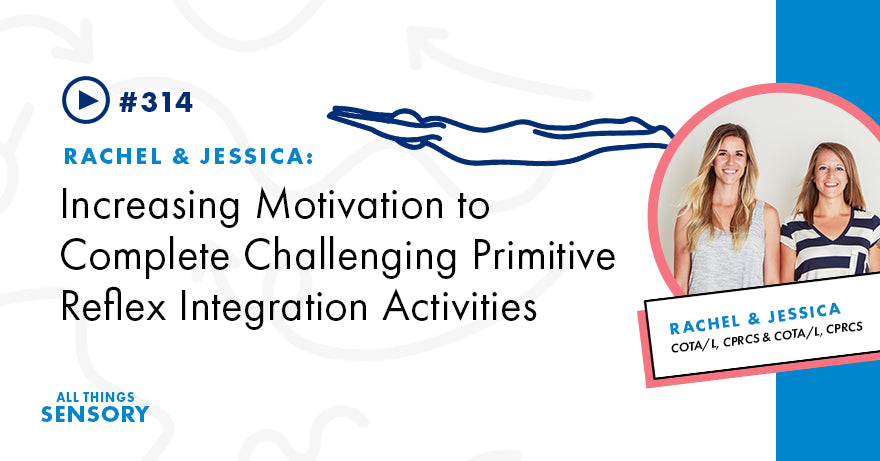Your Cart is Empty

One of our favorite things about our digital courses is that you can ask questions and start conversations inside of the course! We have a comment forum within each module of each course, and we LOVE getting in there to answer questions, brainstorm, and chat about progress!
Today’s episode is a conversation about a question that was posted inside of our primitive reflex digital course. We talk about different reflexes, different challenges associated with those reflexes, and strategies for the specific situation detailed in the question.
We’d love to answer your questions on the podcast! Fill out this form -> https://harkla.typeform.com/to/ItWxQNP3
All Things Sensory Podcast Instagram
Harkla Website - Shop Sensory Products!
Primitive reflexes are automatic movements that develop in the womb and should integrate within the first year of life. However, some children retain these reflexes, impacting their muscle tone, coordination, and overall development.
Integrating these retained reflexes through specific activities can significantly improve a child's ability to function and succeed in daily tasks. But how can we increase children's motivation to engage in these often challenging exercises?
Having an open and honest conversation with the child about how these exercises might help them with their challenges and play to their strengths is essential. By understanding how integrating a retained reflex can enhance their abilities, we can guide them to reach their full potential.
Setting a specific goal, such as holding a Superman pose for a certain amount of time and regularly testing to see if the reflex has integrated, can be very motivating. Celebrating small victories with cheers and positive reinforcement can make a significant difference.
Obstacle courses, games on the floor, and incorporating toys or visual aids can transform a challenging task into an enjoyable one. For example, you can create an obstacle course with tasks like prone extension activities, which work on the Tonic Labyrinthine Reflex (TLR).
Using a scooter board, prone or supine, to pull themselves forward or play catch while lying on their stomach can integrate reflex work into play. Adding variety to the activities can keep the child engaged and excited to participate.
Placing visuals on the floor and ceiling and having the child alternate looking up and down can help integrate reflexes while standing. A metronome for timing can add an auditory component that enhances the exercise.
Engaging in activities with the child can make them feel supported and less alone in their efforts. Parents and therapists doing the activities with the child can provide additional motivation and encouragement.
Additionally, having a reward system, with the parent's permission, can provide extra motivation. Rewards for completing their OT homework or achieving specific goals can entice the process.
Observing and adapting the exercises to fit the child's needs and capabilities is also essential. For instance, if a child struggles with a particular position, modifying the activity to make it more accessible and gradually increasing the difficulty can help.
BORING, BUT NECESSARY LEGAL DISCLAIMERS
While we make every effort to share correct information, we are still learning. We will double check all of our facts but realize that medicine is a constantly changing science and art. One doctor / therapist may have a different way of doing things from another. We are simply presenting our views and opinions on how to address common sensory challenges, health related difficulties and what we have found to be beneficial that will be as evidenced based as possible. By listening to this podcast, you agree not to use this podcast as medical advice to treat any medical condition in either yourself or your children. Consult your child’s pediatrician/ therapist for any medical issues that he or she may be having. This entire disclaimer also applies to any guests or contributors to the podcast. Under no circumstances shall Rachel Harrington, Harkla, Jessica Hill, or any guests or contributors to the podcast, as well as any employees, associates, or affiliates of Harkla, be responsible for damages arising from use of the podcast.
Keep in mind that we may receive commissions when you click our links and make purchases. However, this does not impact our reviews and comparisons. We try our best to keep things fair and balanced, in order to help you make the best choice for you.
This podcast should not be used in any legal capacity whatsoever, including but not limited to establishing “standard of care” in a legal sense or as a basis for expert witness testimony. No guarantee is given regarding the accuracy of any statements or opinions made on the podcast.
Comments will be approved before showing up.